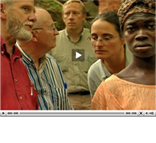
The following was written by Rhode Island for Community & Justice and describes their initiative to seek a state apology for Rhode Island’s long history of slavery and slave trading.
Beginning in 2008, the bicentennial year of the US abolition of the transatlantic slave trade, Rhode Island for Community & Justice (RICJ) has sought to engage Rhode Islanders in dialogue about the state’s history and the contemporary legacy of slavery, to influence a critical mass of people to seek reconciliation in their own lives and to call for acknowledgement, understanding and racial reconciliation through legislative action.
RICJ is a nonprofit with an over 50 year history in the state, fighting prejudice, bigotry and racism by promoting understanding and mutual respect between all races, cultures and religions. In collaboration with other programs working for social justice, RICJ plans to gather thousands of signatures from Rhode Islanders asking the State legislature to pass a resolution including a statement of profound regret and apology for the State’s role in slavery and its aftermath, acknowledgement of the state’s true history of slavery, and education about the many contributions of African Americans to the state.
Rhode Island holds a unique responsibility. While most residents, indeed most Americans today think of slavery as a Southern institution, Rhode Island ships brought more Africans into New World slavery than any other American state.
To date, six state legislatures have enacted resolutions of apology for their role in slavery (Alabama, Maryland, New Jersey, North Carolina, Virginia, Florida) and a resolution in the US Congress is gaining momentum. If Rhode Island passed a similar resolution, it would be the first New England state to do so.
It is imperative such an initiative come from the residents of Rhode Island. Other states have taken legislative action with minimum public input. Our aim is to have Rhode Island pass an apology in the right way – involving the entire state in an educational initiative that builds public understanding of slavery and its continuing legacy in contemporary times, educates the public on contributions of African Americans to our state, and engages the public in a call for racial reconciliation.
This initiative arose out of the “Traces of the Trade Dialogue Project,” funded through a grant from the Rhode Island Foundation to RICJ and Ebb Pod Productions. Traces of the Trade: A Story from the Deep North tells the story of descendants of the DeWolf family of Bristol, RI – the largest slave-trading family in US history. Led by descendant and filmmaker Katrina Browne, ten family members uncover the hidden past, grappling with the contemporary legacy of slavery and issues of reparation and repair.
RICJ’s role was to conduct screenings across the state, following each showing with public dialogue to build heightened awareness and engagement on issues of racial and economic justice. Films like Traces of the Trade, based in story and emotion, are an ideal medium to draw people into heart-felt, transformative dialogue on racial inequality, overcoming stereotypes and denial that may characterize white populations and the anger that may be felt by communities of color. We have found consistently that Traces, by following one family’s journey to deal with the past and place it in a larger context, lowers defenses and brings people closer together rather than pushing them farther apart.
Because of these dynamics, our dialogues generated calls for action. It was common for viewers to ask after watching this film, “what can I do?” At an early screening, a call first arose among the audience for an official State apology for its involvement in the slave trade. In subsequent screenings, audiences echoed the call for an apology, and this became a continuing post-film discussion. Subsequently, RICJ created a petition to the General Assembly asking for a state apology and began gathering audience signatures at screenings. We are now beginning to work with other organizations (advocacy, historical/ preservation, humanities, and educational organizations) to collect signatures. We are utilizing the PBS showings of Traces of the Trade to jumpstart the process of petition-gathering.
Signed petitions will be taken to the General Assembly during the 2009 session. We are seeking foundation funding to create television, radio and print media campaigns for the period just preceding and during the legislative session. Should we receive this funding, we would expect to gather at least 10,000 signatures from across Rhode Island (a state of just over a million people).
